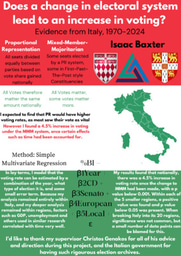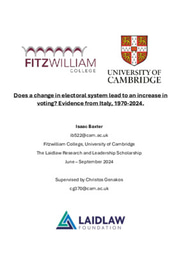Social Cohesion, Drug Policy and Infrastructure: My variety of work at The Helen Clark Foundation
My LIA was spent at the Helen Clark Foundation, a public policy think tank based in Auckland, New Zealand. My time was split between three projects, which I’ll discuss in order of how much time I spent on them. I’m very proud to be the first Laidlaw Scholar at the foundation, but if you’re someone who is looking for an LiA next year and finds this type of work interesting, feel free to message me here, email me at ib522@cam.ac.uk, or message me on LinkedIn at www.linkedin.com/in/isaac-baxter-015416293. The HCF and all the people involved in it are amazing and I’d love to get you in contact.
Policy research is incredibly important. Millions if not billions of pounds a year in the UK, and many billions globally, is spent by governments, charities, and individuals on projects and initiatives that are either doomed to fail, or are much less effective than many other projects out there. It is through better thought out policy and initiatives, that is built up and maintained for decades, that society improves and citizens become happier. The foundation looks to not make quick-fire flashes in the pan, but to produce the kind of policy that New Zealanders not even born yet will be thankful for in their adulthood.
The mission statement of the foundation is to create “Mahi a Rongo”, a term in Te Ao Māori (The Māori Worldview) meaning “works of peace”. This is created through listening, collaborating, and fostering cross-partisan solutions to any issues that are researched. While in her political career the patron of the foundation, Rt Hon Helen Clark, was a Labour PM, the focus of the foundation is on working with all parties and interest groups across the New Zealand spectrum, as this is the only way to create solutions that will last. This is why the foundation continues to have great influence despite the NZ Labour Party not being in power.
My largest piece of work was continuing the ongoing investigation into Social Cohesion in New Zealand. For many years there have been worries from Kiwi society that many factors such as sense of belonging and belief in democracy have been trending downwards. From what we can see, this is definitely true, and the picture is not favourable when put against the neighbours across the Tasman. My work involved analysis of our dataset, which attempted to group people into subcategories (henceforth clusters) based on their responses to our roughly 50 attitudinal questions in the dataset. I found that nearly all of the categories of question (Sense of Belonging, Sense of Worth, Social Inclusion and Justice, Participation in Democracy, and Acceptance of Others) were highly correlated with each other, with the only exception being that Social Inclusion and Justice and Participation in Democracy appear to be independent. But 9 out of 10 isn’t bad at all.
Correlating these clusters with demography was also fascinating, with age making a huge difference in Sense of Belonging, religion in Acceptance of Others (with all individual religions tending to have a positive effect, and no religion having a negative one). The key result for me was that people’s sense of loneliness and satisfaction with their finances were incredibly strong predictors of their cluster groups for all categories. The results are incredibly vast, and many will be published at the release of this year's report in April 2026.
Another aspect of this project was attempting to build a time series of national responses to many of the questions in our dataset. This involved collaboration from many of New Zealand’s best researchers in the psychometric space, as well as great advice from both those who I got data from and the lead of this work, Shamubeel Eaqub. While matching the questions can be difficult, we found that the picture was not as bad as predicted when we looked at trend, but many of the indicators had taken a turn for the worst in the past 5 years, particularly those to do with sense of belonging and belief in democracy.
What did I learn from this? Society has become more lonely and less fair. This is true globally, and if we see New Zealand as a representative case then this spells terrible news for how people feel about society, democracy, freedoms for others, and much more. I believe that the daunting wave of right-wing politics, from the horrific government of the United States to the European wave of right-wing parties from Reform UK to Fidesz, is caused by these two factors first and foremost. Governments that successfully take down large inequalities, in wealth and income, will be the ones that avoid falling out of power, or losing the democratic process entirely.
Now, a some points on my other work. One project saw me evaluate New Zealand’s current drug policing policy, and whether there is political headroom for a more health-based approach as opposed to the current criminal one. This work was assisting Dr Rose Crossin, who is arguably New Zealand’s leading drug and alcohol policy researcher. We found that there is very large headroom, with the vast majority of people wanting more money than is currently spent on health-based approaches such as rehabilitation. In looking at whether we could predict this allocation, the most significant factor was whether someone saw drugs as a health issue or a criminal issue. This answer could be predicted very accurately with a combination of support for the current government (a coalition based around the National Party, the more conservative of New Zealand’s main two), personal experience with drug use, age, ethnicity, and religion.
Important factors that were not on the list include gender, income, perception of harm caused by drugs, whether a person lives rurally or urban, and whether a person has a child in their household. These factors are not insignificant on their own, but come out in the wash once the above factors are accounted for.
What did we learn from this? This project mainly showed me that political decisions are often made too late. New Zealanders clearly want better drug policy, but current government doesn’t prioritise it. Dr Crossin’s work that will be published by the Foundation very soon also shows some fascinating results into how to teach people about these issues. It’s to be published in the next month and will be available freely on the HCF website so watch this space.
On top of this, I also worked on a project that is looking at how infrastructure in New Zealand needs to change to accommodate an ageing population. This project saw me interpret and create demographic projections for different regions of New Zealand, as a guide for the main researcher in the project, Kali Mercier. This project should again be releasing soon, and I’d love to talk about it more but I’ve already mentioned quite a lot.
Working for the foundation of a very population ex-PM also meant that I spent some time with Helen and Murray, the Executive Director of the foundation, meeting with government officials, ambassadors and businesses in New Zealand, all of whom are interested in our work and what it means for them. I have no doubt that with the footprint it has made in only 6 years on New Zealand life, the Foundation will continue to make change for the better, and it has been a joy to be just a small part of that.
My LiA experience was absolutely incredible, spending time working on really amazing research in an amazing organisation. If any of you are interested at all please message me here, email me at ib522@cam.ac.uk, or message me on LinkedIn www.linkedin.com/in/isaac-baxter-015416293.
Thank you once again to the Laidlaw Foundation for the support, through this program I have developed leadership skills of all kinds, become a more aware global citizen, and expanded the network of scholars into a new area, which I am very proud of.


Please sign in
If you are a registered user on Laidlaw Scholars Network, please sign in